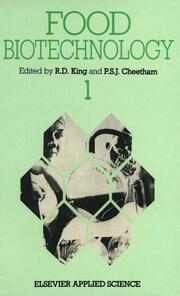Detailansicht
Food Biotechnology 1
ISBN/EAN: 9789401080255
Umbreit-Nr.: 5651626
Sprache:
Englisch
Umfang: xii, 322 S.
Format in cm: 1.6 x 23 x 15
Einband:
kartoniertes Buch
Erschienen am 30.09.2011
Auflage: 1/1987
- Zusatztext
- Biotechnology in its many guises has developed very considerably over the last few years. We now feel that it is appropriate for the publication of a series of books that discuss the technical aspects of biotechnology specifically as applied to foods, and in particular concentrating on new and emerging techniques, processes and products. Food is without doubt one of the oldest bioindustries; however, some of the new areas of biotechnology, such as diagnostic and health-care applications, are likely to mature much faster than applications in the food industry. Eventually, however, biotechnology must have a very great impact on a wide scale in the food industry, simply because of the size and diversity of the industry, and because most food products are substantially natural in origin and are therefore very suitable for processing by biocatalysts. Some of the ways in which the food industry is likely to be affected by developments in biotechnology include the following: The modification of food components to give products with new and/or improved properties, for instance high fructose corn syrups, and by modifying the functional properties of proteins. New methods of assaying food constituents, such as immobilized enzyme sensors. New processes for the production of foods and food components, for instance the use of plant cell cultures for the production of flavours. Many of these topics will be described in detail in this series of books.
- Autorenportrait
- Inhaltsangabe1. Fermenter and Bio-reactor Design.- 2. Improvement of the Processing Properties of British Crops by Genetic Engineering.- 3. Effects of Chemical, Genetic and Enzymatic Modifications on Protein Functionality.- 4. Large Scale Separation and Isolation of Proteins.- 5. New and Modified Polysaccharides.- 6. Detoxifying Enzymes.- 7. Organic Acids by Fermentation, especially Citric Acid.
